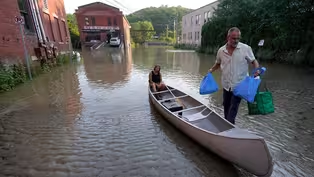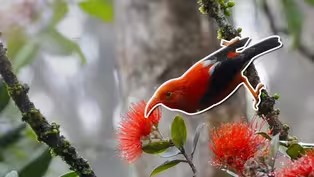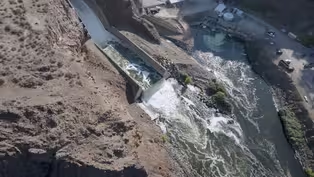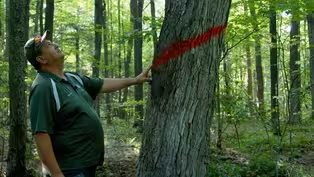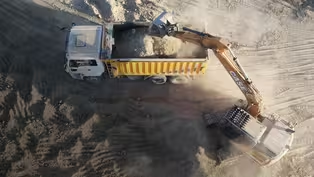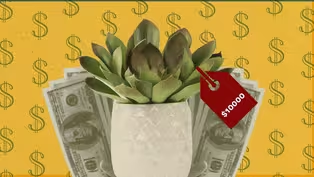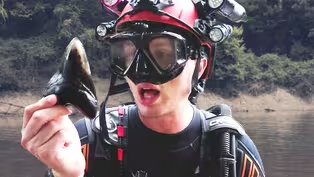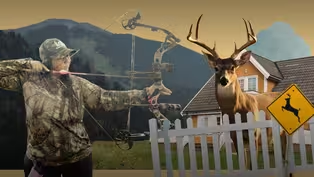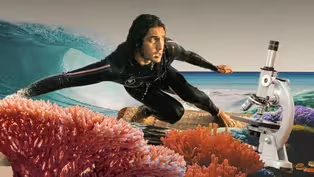
Understory | The Movement to Save Our Night Skies
Special | 12m 59sVideo has Closed Captions
Explore one small town’s mission to save the night sky and help migrating birds.
Explore one town’s mission to become a Dark Sky Community, while researchers discover how darkness is not just important to experience the wonders of the cosmos - it’s vital to maintain healthy ecosystems and save the migrations of America’s birds.
Problems playing video? | Closed Captioning Feedback
Problems playing video? | Closed Captioning Feedback
Major support is provided by Anne Ray Foundation, a Margaret A. Cargill Philanthropy and the Richard King Mellon Foundation. Support is also provided by John and Ruth Huss, Susan and...

Understory | The Movement to Save Our Night Skies
Special | 12m 59sVideo has Closed Captions
Explore one town’s mission to become a Dark Sky Community, while researchers discover how darkness is not just important to experience the wonders of the cosmos - it’s vital to maintain healthy ecosystems and save the migrations of America’s birds.
Problems playing video? | Closed Captioning Feedback
How to Watch America Outdoors with Baratunde Thurston
America Outdoors with Baratunde Thurston is available to stream on pbs.org and the free PBS App, available on iPhone, Apple TV, Android TV, Android smartphones, Amazon Fire TV, Amazon Fire Tablet, Roku, Samsung Smart TV, and Vizio.
Buy Now
Providing Support for PBS.org
Learn Moreabout PBS online sponsorshipMore from This Collection
How does our country’s diverse landscape shape our experience of the outdoors? That’s the central question behind the new PBS digital series, America Outdoors: Understory. Join host, Baratunde Thurston, as he explores the unexpected places and ways Americans encounter nature, and how their time outside is impacted by climate change, equity, access, outdoor culture and more.
Understory | Climate Change's Effects on Vermont Flooding
Video has Closed Captions
Discover the science behind this summer’s historic and devasting floods in Vermont. (13m)
Understory | How Engineered Mosquitos Could Save Birds
Video has Closed Captions
Discover how bacteria could be the key to stopping mosquito-borne illnesses. (11m 37s)
Understory | Can Dam Demolition Save California's Salmon?
Video has Closed Captions
What happens when you remove dams that changed the Klamath River a hundred years ago? (11m 54s)
Understory | Can Ancient Wisdom Save the Forests?
Video has Closed Captions
Forests are in trouble, but could ancient wisdom be the answer to saving our trees? (11m 54s)
Understory | We’re Running Out of Sand
Video has Closed Captions
Sand may seem unremarkable, but the modern world is built on it and we’re running out. (13m 7s)
Understory | Rock Climbing's Troubled Route Naming Tradition
Video has Closed Captions
Baratunde meets a rock climber who is working to diversify the sport. (8m 48s)
Understory | How the Houseplant Boom Fueled Plant Poaching
Video has Closed Captions
Baratunde meets a plant parent who is bringing awareness to the issue of plant poaching. (7m 31s)
Understory | The Fossil Hunter Uncovering Florida’s Past
Video has Closed Captions
Baratunde meets a Florida fossil hunter and learns how this hobby contributes to science. (9m 11s)
Understory | Meet the Suburban Deer Hunters of Long Island
Video has Closed Captions
Baratunde meets a female suburban bowhunter to discuss how the sport is changing. (8m 35s)
Understory | The Scientist Surfing to Fight Climate Change
Video has Closed Captions
Baratunde meets a surfer scientist in Hawaii who is trying to protect the corals reefs. (10m 6s)
Providing Support for PBS.org
Learn Moreabout PBS online sponsorship- It can be easy to get wrapped up in the hustle and bustle of human existence.
But there's one thing I can always return to to remind me just how small we are here on Earth.
And that reminder is, without a doubt, the night sky.
Sadly, here in LA, that light pollution gets in the way of my stargazing all the time.
But what if it didn't have to?
What if we could turn the lights down?
We can.
In fact, there is a movement around the world to reclaim our night skies.
(pensive music) (switch clicks) The mountains of Colorado are home to stunning sights and the town of Paonia is no exception.
- So great to show our little town off like this.
- [Baratunde] Aaron Watson is a climate scientist and engineer living here in Paonia.
- It's our local movie theater.
At certain times of the year, if you hit it just right, the full moon rises right over, (moon whirring) which is pretty cool.
- [Baratunde] Like me, he understands what it's like to live disconnected from the night sky.
- I grew up in Rhode Island and if you go there now, you can't see the stars anymore there.
The sky is diluted by the light pollution.
But here in Paonia, when I finally found this place, I was so inspired by the night sky.
That's when I got my first telescope.
That's when I really started getting into the Dark Sky movement.
- [Baratunde] Aaron is the chair of Dark Sky Colorado, an organization dedicated to the preservation of night skies all across the state.
- About 80% of the people in North America can't see the Milky Way from where they live.
There's too much light pollution.
They call it sky glow.
So it's essentially all the lights from the ground that people use are shining up into the sky.
The light goes up into the atmosphere and bounces off particles in the atmosphere and scatters everywhere you look.
It essentially creates like a perpetual twilight all night long.
- [Baratunde] While most of the country is losing its dark skies due to sky glow, here in Paonia, the skies are only getting darker.
You see, Paonia is working towards becoming a certified Dark Sky Community.
They're taking active measures to protect the night sky by reducing light pollution.
And the results are, well, they're outta this world.
(ethereal music) - In Paonia, we have that rare view where we can still see right in the alleys, in the dark spaces in town, that sparkling band of the Milky Way that you don't have in so many places throughout the United States and even the world.
(ethereal music) - [Baratunde] Imagine stepping out your front door and seeing this night sky.
It's like you're standing on the edge of the universe.
- Once you see the night sky full of stars, it's so amazing and it's just the most awe-inspiring and wonderful thing, like that's been such a part of history, of being a human, you know?
And now we've lost that.
- But light pollution does way more than keep us humans from enjoying the beauty of the stars.
It affects the day-to-day lives of many other species, as well.
- The ecosystem is actually really impacted by artificial light at night.
One example is trees.
A lot of tree species, if they're under a streetlight or around artificial light, they'll actually delay their leaf drop in the autumn.
And so that can have an effect.
You know, if they're getting ready for winter and their leaf drop is delayed, that can affect the health of the tree.
Another one is insects.
So when you see insects circling around that light at night, that's actually not good for the insects.
That tires them out and it makes them die, essentially.
And light pollution's one of the major causes of the insect apocalypse that they're calling.
And another one is birds.
They're devastated by artificial light at night.
- [Baratunde] That's right, birds.
Each year, millions of birds lose their lives due to the effects of light pollution.
Here in Colorado, scientists are studying why.
- I mean, oftentimes people ask what I do.
I tell them about how I spend the nights outside monitoring how many birds are moving over an area and then their first question is, why at night?
And so they're often surprised when I tell 'em that the vast majority of birds are actually migrating under the cover of darkness.
- [Baratunde] Mikko Jimenez is a PhD student at Colorado State University.
He works on a team led by Kyle Horton studying the migrations of birds, bats, and insects.
- We take this knowledge that birds migrate for granted kind of common knowledge now but this wasn't always exactly clear.
I honestly think it's worth highlighting.
People used to think that birds would migrate to the moon or that birds would spend the winter like hibernating under mud.
- [Baratunde] While they may not fly to the moon, birds today still have to overcome a great obstacle to their migration.
They're encountering a pretty novel stimulus, really, in their evolutionary history and that being light pollution.
- So light pollution tends to attract birds to these brightly lit areas where they then face a whole host of factors.
They may get stuck in those areas being disoriented.
They are near novel predators like cats or other human-introduced predators.
It really throws them off where they're migrating.
They can change the direction that they're migrating.
We're gonna go set up our tents.
I don't know if that's something you want to shoot or not.
Oh, yeah.
Okay.
- [Baratunde] With so many birds migrating at night scientists like Mikko and Kyle face a challenge of their own, watching for birds in pitch darkness.
This is where modern science gets to shine.
- And one of the more useful tools that we've started using a little bit more recently is radar.
- Yeah, so this behind us is a small scale radar and this tool is something that allows us to really see what's going on up in the atmosphere at night.
- [Baratunde] Okay, I'm gonna need a breakdown of how all this works.
- So right now it's warming up.
This screen here, this interface basically shows us what it's seeing, you know, directly above it.
It'll be a lot cooler once it's happening.
(laughs) So we're actually moving now.
The radar just started sending out signals.
So here already, we're starting to see some insects in the atmosphere as well as some songbirds.
You know, as the night moves through, we'll get to see what's passing over the site.
And for us, that means what birds, how many birds and what direction they're heading.
- [Baratunde] Using a series of radars across different sites, the team can track large scale bird migration patterns and generate maps that show when and where birds will pass overhead.
- And when we start digging through this data, we can see some nights have a few birds moving and some nights have a tremendous number of birds moving.
And when I mean a tremendous number, we're talking about hundreds of millions of birds moving through airspace at continental scales.
- [Baratunde] Wow, that's a lot of birds.
- Yeah, it's a lot of birds.
- [Baratunde] Clearly, preserving the darkness of the night skies is tremendously important, not just for us, but the ecosystem around us.
(pensive music) So what can communities do to combat light pollution?
- So here in Paonia, we have a lighting ordinance in place that's Dark Sky compliant and that asks residents to be responsible with their lighting and follow the Dark Sky principles.
The first one is shielding.
So it's putting a shield on the light so that it's shining down.
It's not shining up into the sky and it's not shining into your neighbor's land.
The second piece is color temperature.
So we want a low color temperature.
We want more warmer, amber colored light not the blue and white light.
Those are too harsh on the environment.
And the third one is we want to keep our light dim.
Only use as much light as we need, and not anymore.
- [Baratunde] These are examples of the kinds of regulations that ensure Dark Sky Communities stay that way.
As of July 2023, there are 40 certified Dark Sky Communities in the world and Colorado hosts five of them, with many more like Paonia making the switch.
- So here's a great example of Dark Sky friendly lighting.
Look how it's off.
(people laughing) So it's not needed.
It's plenty bright here, and great, they have 'em turned off.
That's wonderful.
- [Baratunde] And it's not just small towns making changes to minimize sky glow.
Cities like Tucson, Arizona have reclaimed their beautiful night skies as well.
So we know Aaron is a big fan of the Dark Sky movement, but what about his neighbors?
How do they feel about these changes?
(man laughing) - I was originally on that committee that put together the Dark Skies initiative.
You know, most people were very much in favor of it.
We had a few people say, no.
- The stars are magnificent.
You can walk outside any night.
And right up over head, right up right there, you can see the Big Dipper just as clear as can be.
- You wanna step outside and just absorb the infinite galaxy that is around us.
- You know, there's a lot of parts of the Dark Skies that I agreed with.
And then there were things that I very strongly disagreed with.
- Being outside, and your neighbor has a floodlight on their garage and it's the middle of the night, for no reason.
- Do I think I have a right to shine a spotlight on my neighbor's window?
No, but I felt like the pendulum swung too far on restrictions.
It was an overreach.
- I mean, I lived off the grid on the side of a mountain for five years.
So the more stars, the better, in my opinion.
- It's clear this ordinance inspires some pretty strong emotions.
Which brings up a good point.
How realistic is it for communities across the country to commit to these kind of practices?
Does a city like LA need to go fully dark?
- People think that Dark Sky, we're trying to come and take the lights away.
We're not.
We're just asking people to use it responsibly and not shine it into the night sky or into their neighbor's yard.
You know, we're not really trying to tell people what to do.
We'd rather educate people and have them make the right decision themselves 'cause once they have the education, it's really a win-win for everyone.
You know, you get the light where you need it and then you don't have it where you don't.
That's really all we're asking.
- [Baratunde] The path forward involves intentionality.
- Welcome to the living room.
Water's hot if you want it.
- [Baratunde] And for ecologists, like Mikko and Kyle, the data they collect may hold the key.
Remember this statistic from earlier?
- We're talking about hundreds of millions of birds moving through airspace at continental scales.
- [Baratunde] When they break down that statistic even further... - We actually find that it's just 10 nights of migration are gonna account for 50% of migrants moving through an area.
- [Baratunde] This migration happens twice a year which is about 20 nights total.
That's wild.
Literally, because scientists can warn the locals to make sure they've dim the lights when the birds are most at risk.
- That kind of statistic really colors the way that we approach conservation because we should ideally be trying to help birds as they migrate all the time, right?
But if we know the nights, when the majority of birds are migrating, then we can make sure that we take action on those really big nights of migration.
- The data we're providing, the alerts that we're providing, they're being used by cities.
We see this in Chicago and New York, parts of Texas and Houston, Dallas, Fort Worth.
Light pollution does have a pretty tractable solution.
It's not a trivial solution of turning off lights but it's something that if we did it tonight, it would have a positive impact immediately.
And that's not true of most environmental issues.
That's what excites me about this work.
- [Baratunde] So don't worry, we don't have to go back to the Stone Age to reclaim our night skies and we don't need to go fully dark either to help the ecosystems around us.
Being a Dark Sky Community is about more than just ordinances.
(upbeat folk music) It's about getting to know your community.
- [Aaron] It's really just a few people coming together.
That's how we make change.
Arron.
- Arron.
Meghan.
Nice to meet you.
- Pleasure to meet ya.
- This is Chuck.
- Chuck?
- [Aaron] There's really no reason not to enjoy the night sky.
It just fills me with wonder and awe to see a night sky full of stars.
And that is something that I think everyone in the world should have the opportunity to see.
- Brilliant.
(people exclaiming) - Wow.
Yeah.
(people faintly talking) - Wow.
(ethereal music) - [Aaron] This makes people happy.
Like really happy in a really deep way.
- [Woman] Oh, that is so lovely.
- Taking back our night sky may require taking some intentional, sometimes cumbersome steps but the reward?
Is magnificent.
(ethereal music) Thank you for watching and for more amazing stories about the great outdoors, checkout season two of America Outdoors, with Baratunde Thurston.
(bell chimes) We're in the PBS app.
We're in your PBS local station.
And find out even more at the link in the description below.
Thanks.
(gentle music)

- Science and Nature

Explore scientific discoveries on television's most acclaimed science documentary series.

- Science and Nature

Capturing the splendor of the natural world, from the African plains to the Antarctic ice.












Support for PBS provided by:
Major support is provided by Anne Ray Foundation, a Margaret A. Cargill Philanthropy and the Richard King Mellon Foundation. Support is also provided by John and Ruth Huss, Susan and...
